Detailed Case Study: ASIC v Whitlam and Breaches of Directors' Duty
VerifiedAdded on 2023/06/11
|8
|2220
|112
Case Study
AI Summary
This case study provides an in-depth analysis of the ASIC v Whitlam [2002] NSWSC 591 case, examining the alleged breaches of directors' duties under the Corporation Law and the Corporations Act 2001 (Cth). It details the facts of the case, including allegations against the defendant director, Mr. Whitlam, for failing to properly handle proxy votes and altering board minutes related to his remuneration. The analysis covers the specific legal provisions allegedly violated, such as sections 232 and 250A of the Corporation Law (repealed) and sections 180, 181, and 182 of the Corporations Act 2001 (Cth). The court's decision, which found breaches related to proxy voting and minute alteration, is critically analyzed, along with the arguments presented by the director. The study concludes by outlining the implications of the court's decision for corporate governance, particularly concerning the role of a chairman and compliance with proxy requirements. Desklib offers a wealth of resources, including similar case studies and solved assignments, to aid students in their understanding of corporate law.
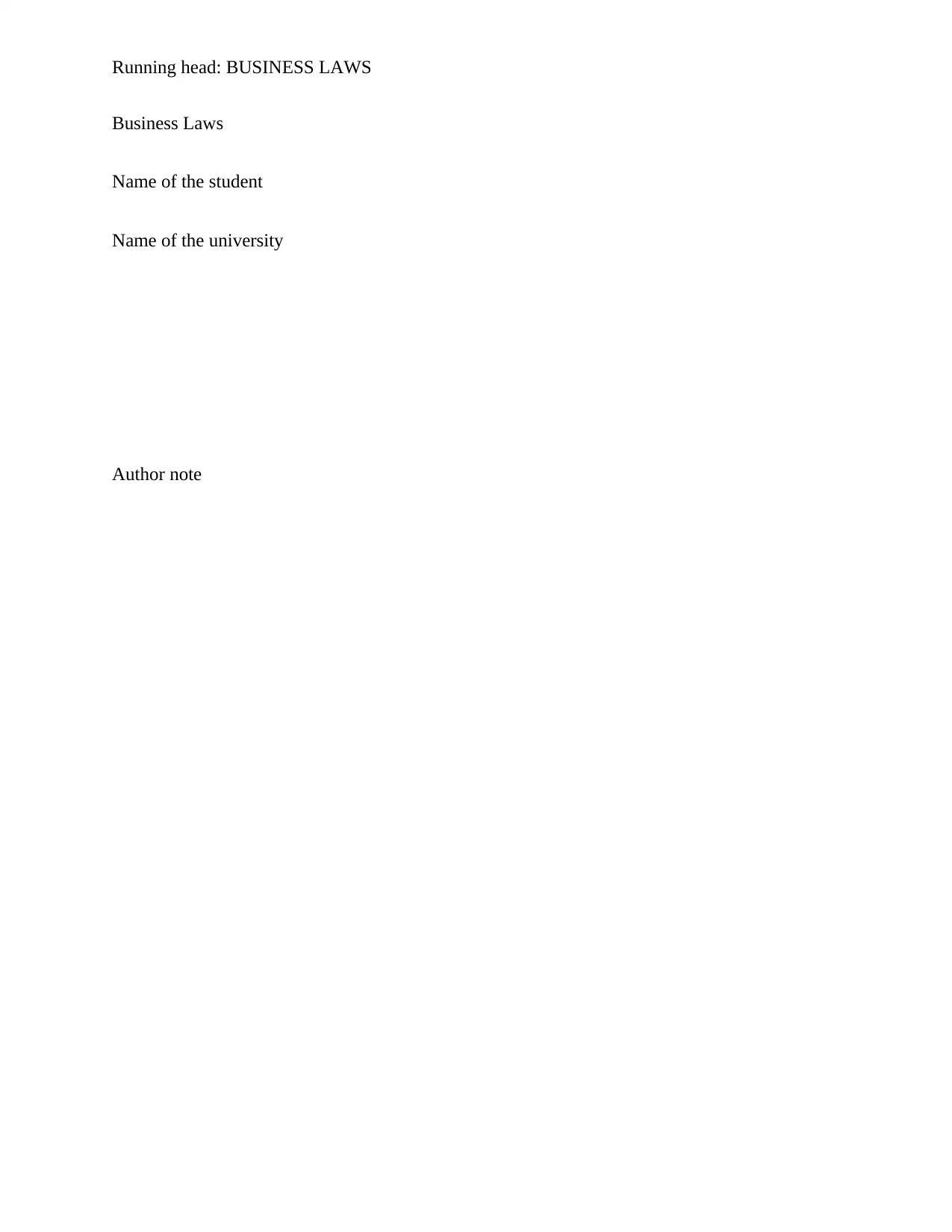
Running head: BUSINESS LAWS
Business Laws
Name of the student
Name of the university
Author note
Business Laws
Name of the student
Name of the university
Author note
Paraphrase This Document
Need a fresh take? Get an instant paraphrase of this document with our AI Paraphraser
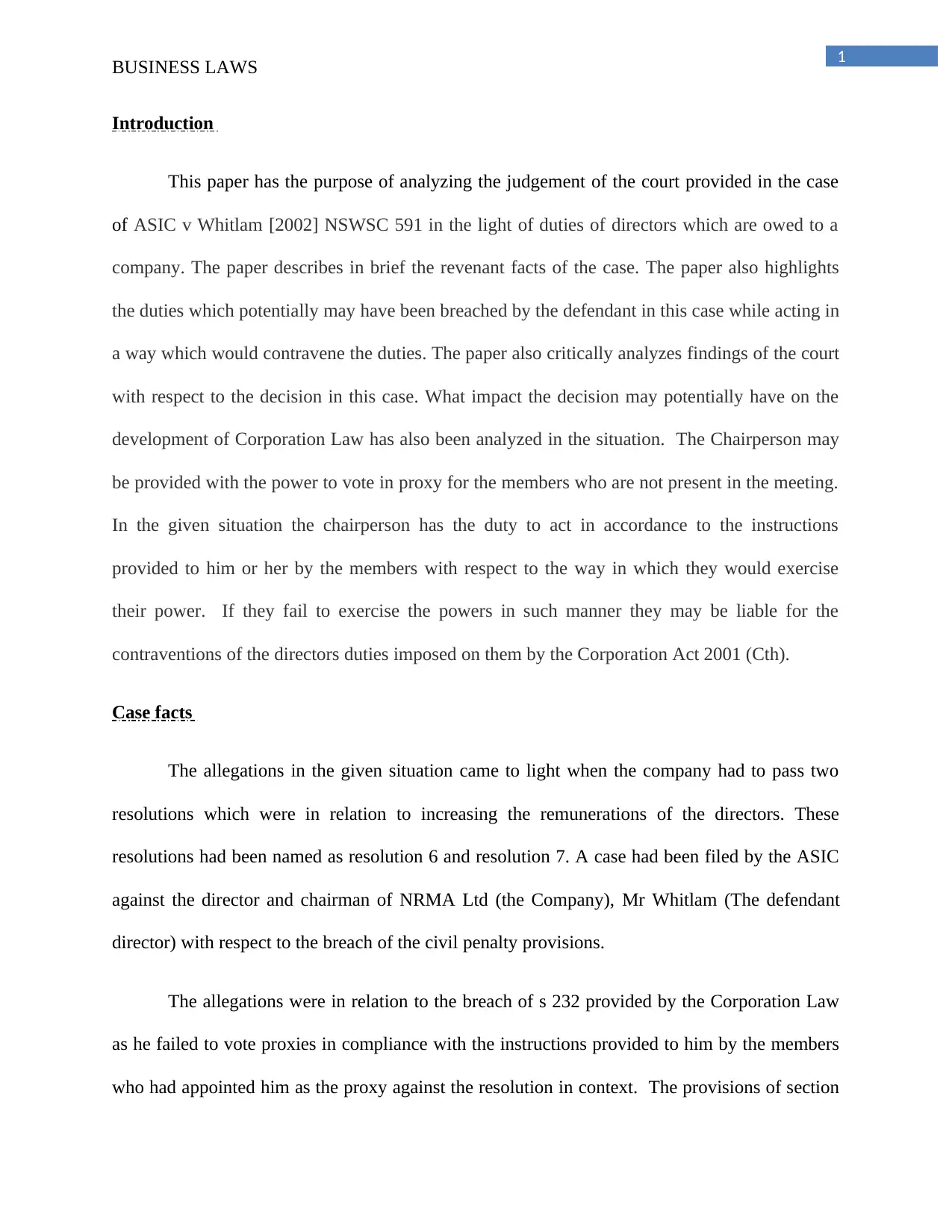
1
BUSINESS LAWS
Introduction
This paper has the purpose of analyzing the judgement of the court provided in the case
of ASIC v Whitlam [2002] NSWSC 591 in the light of duties of directors which are owed to a
company. The paper describes in brief the revenant facts of the case. The paper also highlights
the duties which potentially may have been breached by the defendant in this case while acting in
a way which would contravene the duties. The paper also critically analyzes findings of the court
with respect to the decision in this case. What impact the decision may potentially have on the
development of Corporation Law has also been analyzed in the situation. The Chairperson may
be provided with the power to vote in proxy for the members who are not present in the meeting.
In the given situation the chairperson has the duty to act in accordance to the instructions
provided to him or her by the members with respect to the way in which they would exercise
their power. If they fail to exercise the powers in such manner they may be liable for the
contraventions of the directors duties imposed on them by the Corporation Act 2001 (Cth).
Case facts
The allegations in the given situation came to light when the company had to pass two
resolutions which were in relation to increasing the remunerations of the directors. These
resolutions had been named as resolution 6 and resolution 7. A case had been filed by the ASIC
against the director and chairman of NRMA Ltd (the Company), Mr Whitlam (The defendant
director) with respect to the breach of the civil penalty provisions.
The allegations were in relation to the breach of s 232 provided by the Corporation Law
as he failed to vote proxies in compliance with the instructions provided to him by the members
who had appointed him as the proxy against the resolution in context. The provisions of section
BUSINESS LAWS
Introduction
This paper has the purpose of analyzing the judgement of the court provided in the case
of ASIC v Whitlam [2002] NSWSC 591 in the light of duties of directors which are owed to a
company. The paper describes in brief the revenant facts of the case. The paper also highlights
the duties which potentially may have been breached by the defendant in this case while acting in
a way which would contravene the duties. The paper also critically analyzes findings of the court
with respect to the decision in this case. What impact the decision may potentially have on the
development of Corporation Law has also been analyzed in the situation. The Chairperson may
be provided with the power to vote in proxy for the members who are not present in the meeting.
In the given situation the chairperson has the duty to act in accordance to the instructions
provided to him or her by the members with respect to the way in which they would exercise
their power. If they fail to exercise the powers in such manner they may be liable for the
contraventions of the directors duties imposed on them by the Corporation Act 2001 (Cth).
Case facts
The allegations in the given situation came to light when the company had to pass two
resolutions which were in relation to increasing the remunerations of the directors. These
resolutions had been named as resolution 6 and resolution 7. A case had been filed by the ASIC
against the director and chairman of NRMA Ltd (the Company), Mr Whitlam (The defendant
director) with respect to the breach of the civil penalty provisions.
The allegations were in relation to the breach of s 232 provided by the Corporation Law
as he failed to vote proxies in compliance with the instructions provided to him by the members
who had appointed him as the proxy against the resolution in context. The provisions of section
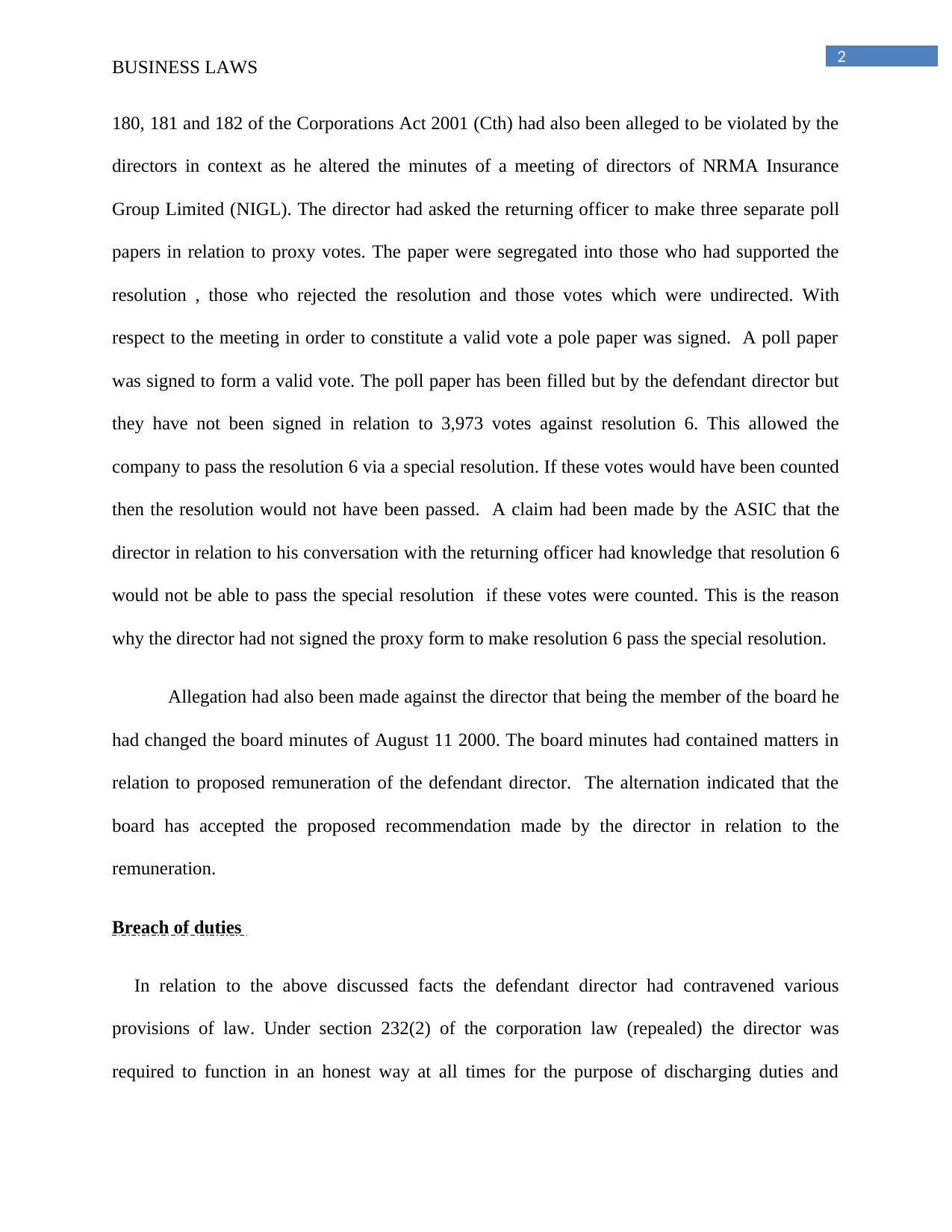
2
BUSINESS LAWS
180, 181 and 182 of the Corporations Act 2001 (Cth) had also been alleged to be violated by the
directors in context as he altered the minutes of a meeting of directors of NRMA Insurance
Group Limited (NIGL). The director had asked the returning officer to make three separate poll
papers in relation to proxy votes. The paper were segregated into those who had supported the
resolution , those who rejected the resolution and those votes which were undirected. With
respect to the meeting in order to constitute a valid vote a pole paper was signed. A poll paper
was signed to form a valid vote. The poll paper has been filled but by the defendant director but
they have not been signed in relation to 3,973 votes against resolution 6. This allowed the
company to pass the resolution 6 via a special resolution. If these votes would have been counted
then the resolution would not have been passed. A claim had been made by the ASIC that the
director in relation to his conversation with the returning officer had knowledge that resolution 6
would not be able to pass the special resolution if these votes were counted. This is the reason
why the director had not signed the proxy form to make resolution 6 pass the special resolution.
Allegation had also been made against the director that being the member of the board he
had changed the board minutes of August 11 2000. The board minutes had contained matters in
relation to proposed remuneration of the defendant director. The alternation indicated that the
board has accepted the proposed recommendation made by the director in relation to the
remuneration.
Breach of duties
In relation to the above discussed facts the defendant director had contravened various
provisions of law. Under section 232(2) of the corporation law (repealed) the director was
required to function in an honest way at all times for the purpose of discharging duties and
BUSINESS LAWS
180, 181 and 182 of the Corporations Act 2001 (Cth) had also been alleged to be violated by the
directors in context as he altered the minutes of a meeting of directors of NRMA Insurance
Group Limited (NIGL). The director had asked the returning officer to make three separate poll
papers in relation to proxy votes. The paper were segregated into those who had supported the
resolution , those who rejected the resolution and those votes which were undirected. With
respect to the meeting in order to constitute a valid vote a pole paper was signed. A poll paper
was signed to form a valid vote. The poll paper has been filled but by the defendant director but
they have not been signed in relation to 3,973 votes against resolution 6. This allowed the
company to pass the resolution 6 via a special resolution. If these votes would have been counted
then the resolution would not have been passed. A claim had been made by the ASIC that the
director in relation to his conversation with the returning officer had knowledge that resolution 6
would not be able to pass the special resolution if these votes were counted. This is the reason
why the director had not signed the proxy form to make resolution 6 pass the special resolution.
Allegation had also been made against the director that being the member of the board he
had changed the board minutes of August 11 2000. The board minutes had contained matters in
relation to proposed remuneration of the defendant director. The alternation indicated that the
board has accepted the proposed recommendation made by the director in relation to the
remuneration.
Breach of duties
In relation to the above discussed facts the defendant director had contravened various
provisions of law. Under section 232(2) of the corporation law (repealed) the director was
required to function in an honest way at all times for the purpose of discharging duties and
⊘ This is a preview!⊘
Do you want full access?
Subscribe today to unlock all pages.

Trusted by 1+ million students worldwide
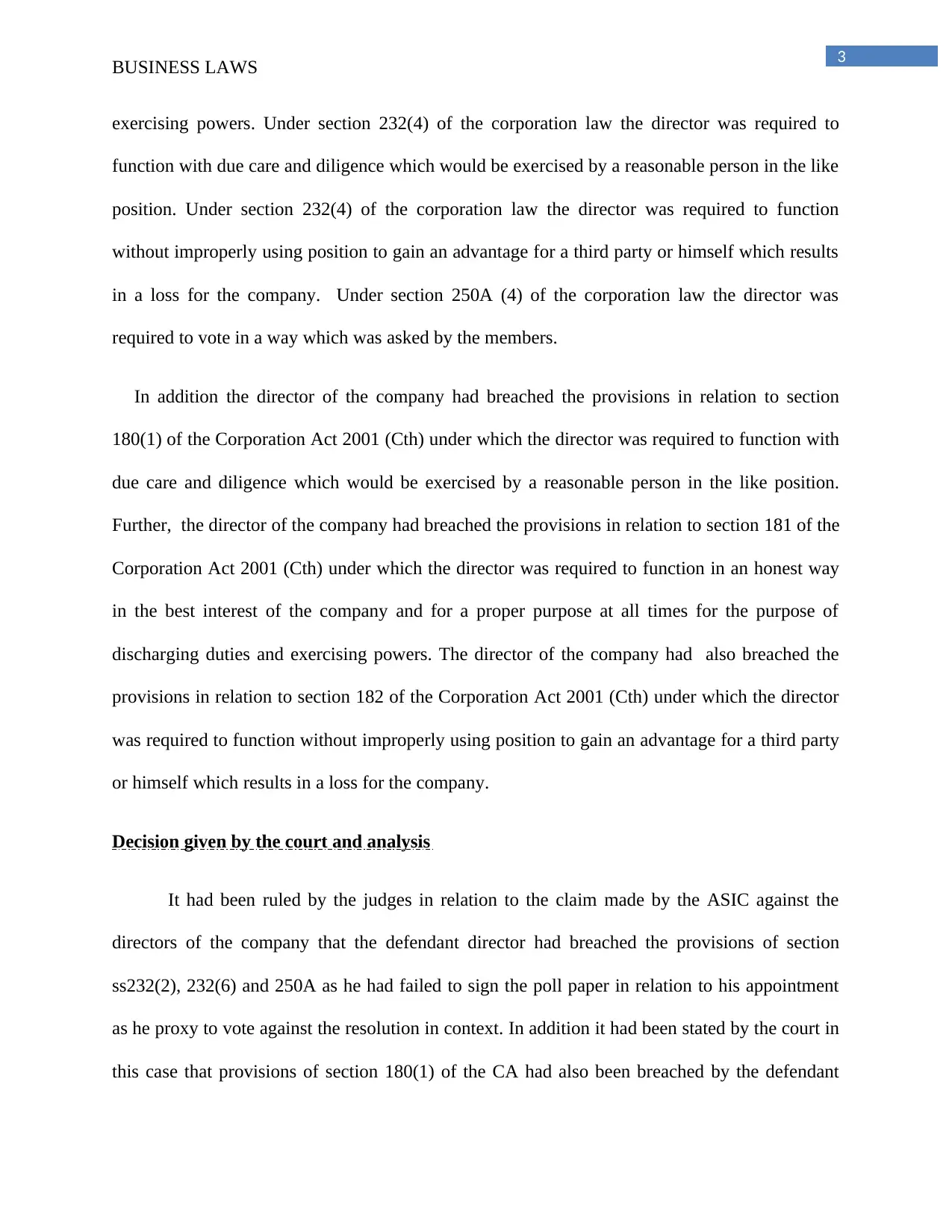
3
BUSINESS LAWS
exercising powers. Under section 232(4) of the corporation law the director was required to
function with due care and diligence which would be exercised by a reasonable person in the like
position. Under section 232(4) of the corporation law the director was required to function
without improperly using position to gain an advantage for a third party or himself which results
in a loss for the company. Under section 250A (4) of the corporation law the director was
required to vote in a way which was asked by the members.
In addition the director of the company had breached the provisions in relation to section
180(1) of the Corporation Act 2001 (Cth) under which the director was required to function with
due care and diligence which would be exercised by a reasonable person in the like position.
Further, the director of the company had breached the provisions in relation to section 181 of the
Corporation Act 2001 (Cth) under which the director was required to function in an honest way
in the best interest of the company and for a proper purpose at all times for the purpose of
discharging duties and exercising powers. The director of the company had also breached the
provisions in relation to section 182 of the Corporation Act 2001 (Cth) under which the director
was required to function without improperly using position to gain an advantage for a third party
or himself which results in a loss for the company.
Decision given by the court and analysis
It had been ruled by the judges in relation to the claim made by the ASIC against the
directors of the company that the defendant director had breached the provisions of section
ss232(2), 232(6) and 250A as he had failed to sign the poll paper in relation to his appointment
as he proxy to vote against the resolution in context. In addition it had been stated by the court in
this case that provisions of section 180(1) of the CA had also been breached by the defendant
BUSINESS LAWS
exercising powers. Under section 232(4) of the corporation law the director was required to
function with due care and diligence which would be exercised by a reasonable person in the like
position. Under section 232(4) of the corporation law the director was required to function
without improperly using position to gain an advantage for a third party or himself which results
in a loss for the company. Under section 250A (4) of the corporation law the director was
required to vote in a way which was asked by the members.
In addition the director of the company had breached the provisions in relation to section
180(1) of the Corporation Act 2001 (Cth) under which the director was required to function with
due care and diligence which would be exercised by a reasonable person in the like position.
Further, the director of the company had breached the provisions in relation to section 181 of the
Corporation Act 2001 (Cth) under which the director was required to function in an honest way
in the best interest of the company and for a proper purpose at all times for the purpose of
discharging duties and exercising powers. The director of the company had also breached the
provisions in relation to section 182 of the Corporation Act 2001 (Cth) under which the director
was required to function without improperly using position to gain an advantage for a third party
or himself which results in a loss for the company.
Decision given by the court and analysis
It had been ruled by the judges in relation to the claim made by the ASIC against the
directors of the company that the defendant director had breached the provisions of section
ss232(2), 232(6) and 250A as he had failed to sign the poll paper in relation to his appointment
as he proxy to vote against the resolution in context. In addition it had been stated by the court in
this case that provisions of section 180(1) of the CA had also been breached by the defendant
Paraphrase This Document
Need a fresh take? Get an instant paraphrase of this document with our AI Paraphraser
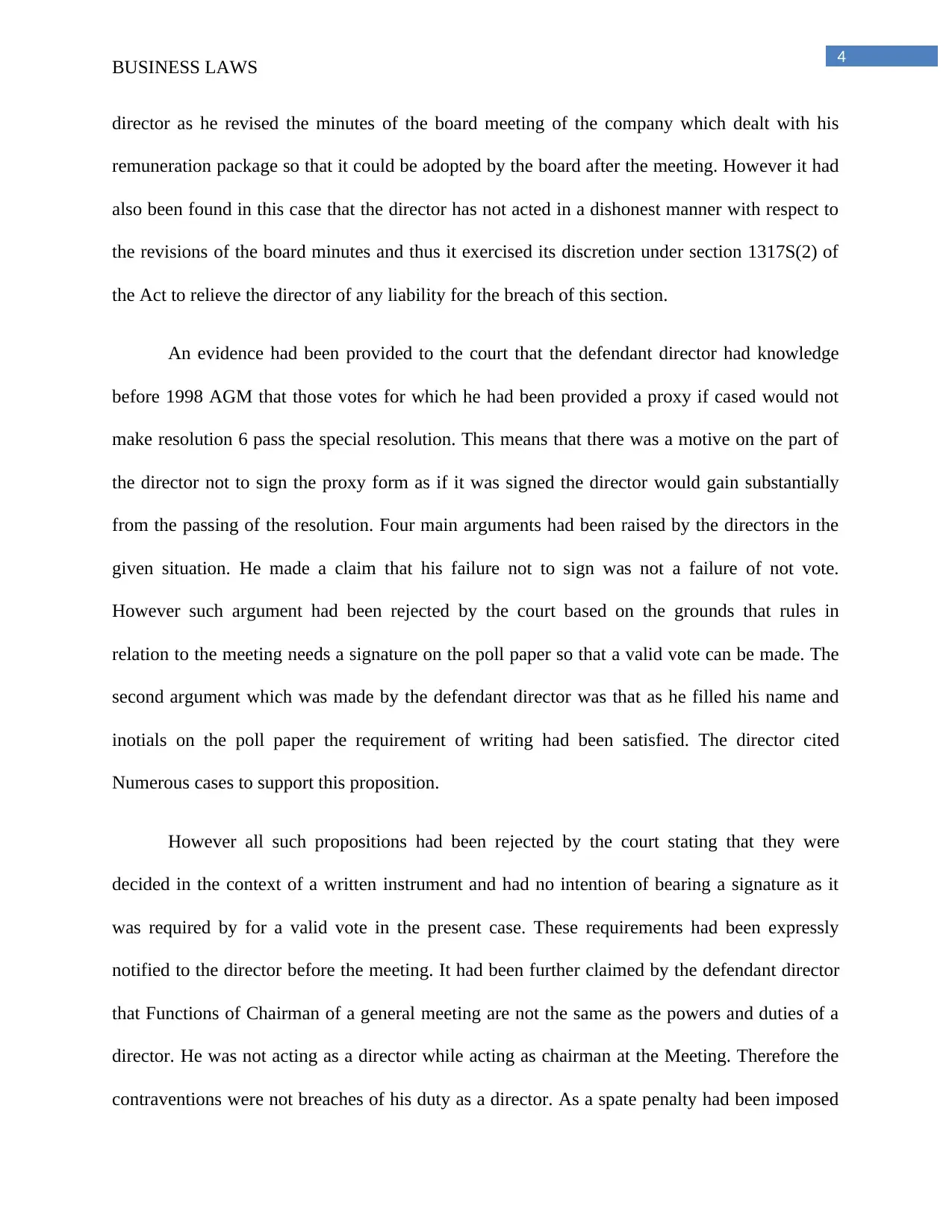
4
BUSINESS LAWS
director as he revised the minutes of the board meeting of the company which dealt with his
remuneration package so that it could be adopted by the board after the meeting. However it had
also been found in this case that the director has not acted in a dishonest manner with respect to
the revisions of the board minutes and thus it exercised its discretion under section 1317S(2) of
the Act to relieve the director of any liability for the breach of this section.
An evidence had been provided to the court that the defendant director had knowledge
before 1998 AGM that those votes for which he had been provided a proxy if cased would not
make resolution 6 pass the special resolution. This means that there was a motive on the part of
the director not to sign the proxy form as if it was signed the director would gain substantially
from the passing of the resolution. Four main arguments had been raised by the directors in the
given situation. He made a claim that his failure not to sign was not a failure of not vote.
However such argument had been rejected by the court based on the grounds that rules in
relation to the meeting needs a signature on the poll paper so that a valid vote can be made. The
second argument which was made by the defendant director was that as he filled his name and
inotials on the poll paper the requirement of writing had been satisfied. The director cited
Numerous cases to support this proposition.
However all such propositions had been rejected by the court stating that they were
decided in the context of a written instrument and had no intention of bearing a signature as it
was required by for a valid vote in the present case. These requirements had been expressly
notified to the director before the meeting. It had been further claimed by the defendant director
that Functions of Chairman of a general meeting are not the same as the powers and duties of a
director. He was not acting as a director while acting as chairman at the Meeting. Therefore the
contraventions were not breaches of his duty as a director. As a spate penalty had been imposed
BUSINESS LAWS
director as he revised the minutes of the board meeting of the company which dealt with his
remuneration package so that it could be adopted by the board after the meeting. However it had
also been found in this case that the director has not acted in a dishonest manner with respect to
the revisions of the board minutes and thus it exercised its discretion under section 1317S(2) of
the Act to relieve the director of any liability for the breach of this section.
An evidence had been provided to the court that the defendant director had knowledge
before 1998 AGM that those votes for which he had been provided a proxy if cased would not
make resolution 6 pass the special resolution. This means that there was a motive on the part of
the director not to sign the proxy form as if it was signed the director would gain substantially
from the passing of the resolution. Four main arguments had been raised by the directors in the
given situation. He made a claim that his failure not to sign was not a failure of not vote.
However such argument had been rejected by the court based on the grounds that rules in
relation to the meeting needs a signature on the poll paper so that a valid vote can be made. The
second argument which was made by the defendant director was that as he filled his name and
inotials on the poll paper the requirement of writing had been satisfied. The director cited
Numerous cases to support this proposition.
However all such propositions had been rejected by the court stating that they were
decided in the context of a written instrument and had no intention of bearing a signature as it
was required by for a valid vote in the present case. These requirements had been expressly
notified to the director before the meeting. It had been further claimed by the defendant director
that Functions of Chairman of a general meeting are not the same as the powers and duties of a
director. He was not acting as a director while acting as chairman at the Meeting. Therefore the
contraventions were not breaches of his duty as a director. As a spate penalty had been imposed
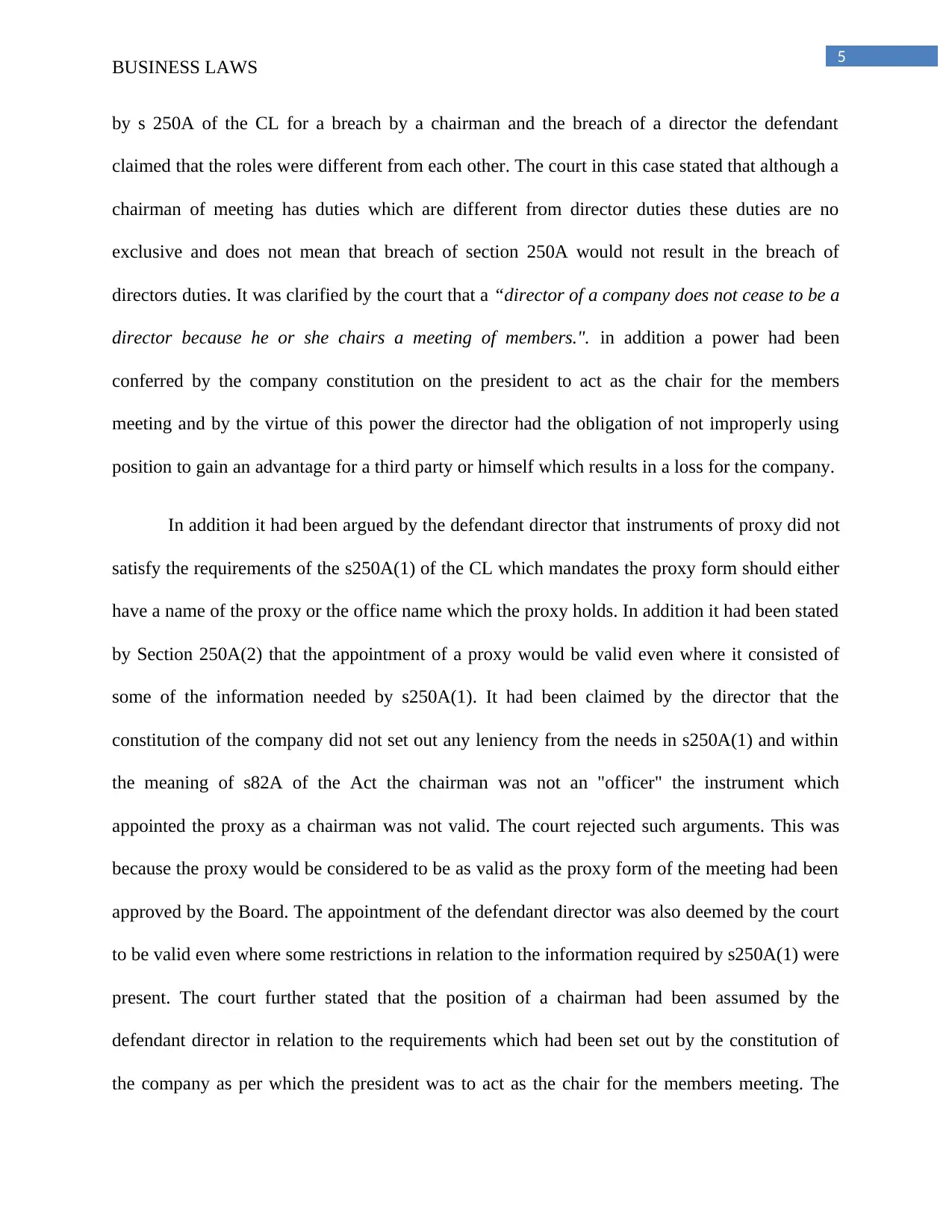
5
BUSINESS LAWS
by s 250A of the CL for a breach by a chairman and the breach of a director the defendant
claimed that the roles were different from each other. The court in this case stated that although a
chairman of meeting has duties which are different from director duties these duties are no
exclusive and does not mean that breach of section 250A would not result in the breach of
directors duties. It was clarified by the court that a “director of a company does not cease to be a
director because he or she chairs a meeting of members.". in addition a power had been
conferred by the company constitution on the president to act as the chair for the members
meeting and by the virtue of this power the director had the obligation of not improperly using
position to gain an advantage for a third party or himself which results in a loss for the company.
In addition it had been argued by the defendant director that instruments of proxy did not
satisfy the requirements of the s250A(1) of the CL which mandates the proxy form should either
have a name of the proxy or the office name which the proxy holds. In addition it had been stated
by Section 250A(2) that the appointment of a proxy would be valid even where it consisted of
some of the information needed by s250A(1). It had been claimed by the director that the
constitution of the company did not set out any leniency from the needs in s250A(1) and within
the meaning of s82A of the Act the chairman was not an "officer" the instrument which
appointed the proxy as a chairman was not valid. The court rejected such arguments. This was
because the proxy would be considered to be as valid as the proxy form of the meeting had been
approved by the Board. The appointment of the defendant director was also deemed by the court
to be valid even where some restrictions in relation to the information required by s250A(1) were
present. The court further stated that the position of a chairman had been assumed by the
defendant director in relation to the requirements which had been set out by the constitution of
the company as per which the president was to act as the chair for the members meeting. The
BUSINESS LAWS
by s 250A of the CL for a breach by a chairman and the breach of a director the defendant
claimed that the roles were different from each other. The court in this case stated that although a
chairman of meeting has duties which are different from director duties these duties are no
exclusive and does not mean that breach of section 250A would not result in the breach of
directors duties. It was clarified by the court that a “director of a company does not cease to be a
director because he or she chairs a meeting of members.". in addition a power had been
conferred by the company constitution on the president to act as the chair for the members
meeting and by the virtue of this power the director had the obligation of not improperly using
position to gain an advantage for a third party or himself which results in a loss for the company.
In addition it had been argued by the defendant director that instruments of proxy did not
satisfy the requirements of the s250A(1) of the CL which mandates the proxy form should either
have a name of the proxy or the office name which the proxy holds. In addition it had been stated
by Section 250A(2) that the appointment of a proxy would be valid even where it consisted of
some of the information needed by s250A(1). It had been claimed by the director that the
constitution of the company did not set out any leniency from the needs in s250A(1) and within
the meaning of s82A of the Act the chairman was not an "officer" the instrument which
appointed the proxy as a chairman was not valid. The court rejected such arguments. This was
because the proxy would be considered to be as valid as the proxy form of the meeting had been
approved by the Board. The appointment of the defendant director was also deemed by the court
to be valid even where some restrictions in relation to the information required by s250A(1) were
present. The court further stated that the position of a chairman had been assumed by the
defendant director in relation to the requirements which had been set out by the constitution of
the company as per which the president was to act as the chair for the members meeting. The
⊘ This is a preview!⊘
Do you want full access?
Subscribe today to unlock all pages.

Trusted by 1+ million students worldwide
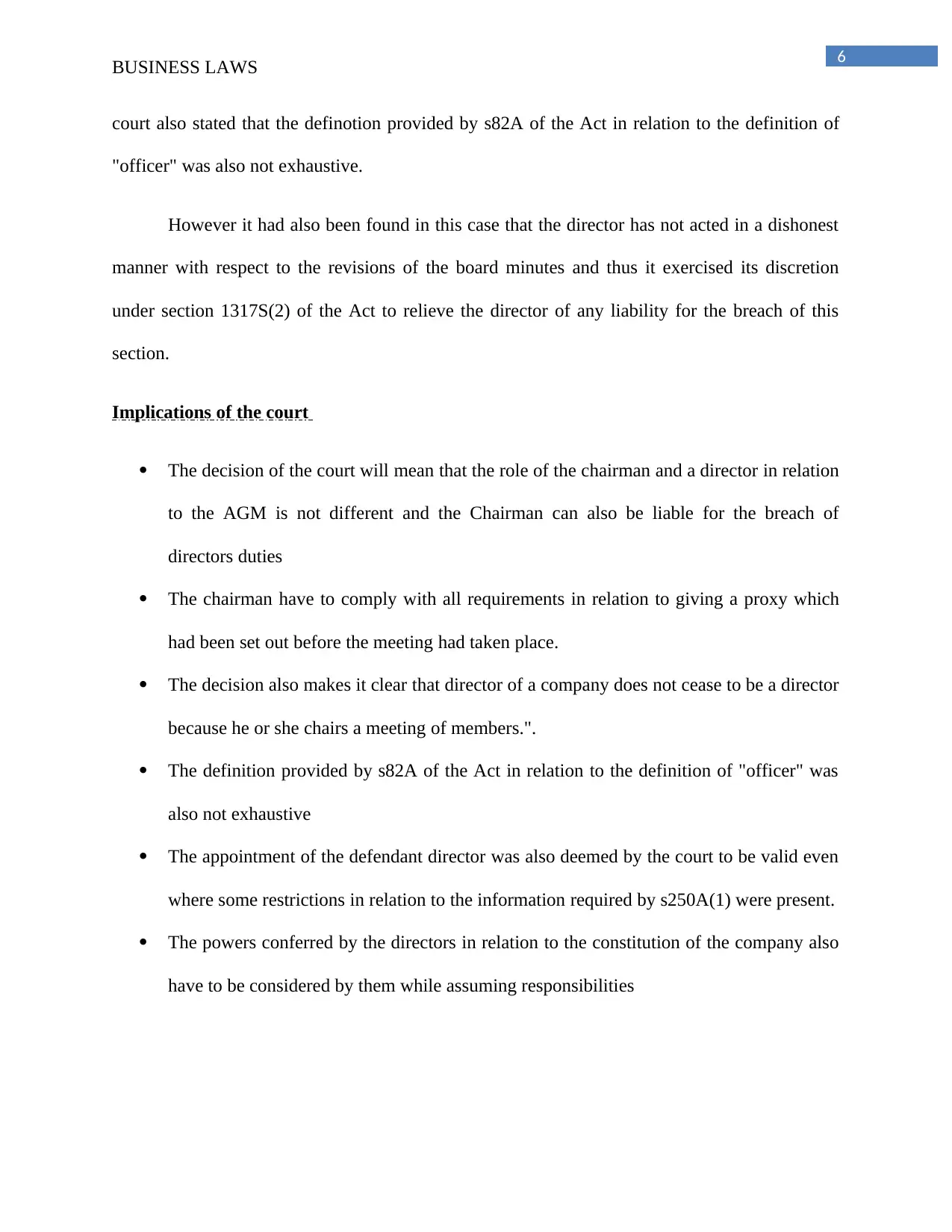
6
BUSINESS LAWS
court also stated that the definotion provided by s82A of the Act in relation to the definition of
"officer" was also not exhaustive.
However it had also been found in this case that the director has not acted in a dishonest
manner with respect to the revisions of the board minutes and thus it exercised its discretion
under section 1317S(2) of the Act to relieve the director of any liability for the breach of this
section.
Implications of the court
The decision of the court will mean that the role of the chairman and a director in relation
to the AGM is not different and the Chairman can also be liable for the breach of
directors duties
The chairman have to comply with all requirements in relation to giving a proxy which
had been set out before the meeting had taken place.
The decision also makes it clear that director of a company does not cease to be a director
because he or she chairs a meeting of members.".
The definition provided by s82A of the Act in relation to the definition of "officer" was
also not exhaustive
The appointment of the defendant director was also deemed by the court to be valid even
where some restrictions in relation to the information required by s250A(1) were present.
The powers conferred by the directors in relation to the constitution of the company also
have to be considered by them while assuming responsibilities
BUSINESS LAWS
court also stated that the definotion provided by s82A of the Act in relation to the definition of
"officer" was also not exhaustive.
However it had also been found in this case that the director has not acted in a dishonest
manner with respect to the revisions of the board minutes and thus it exercised its discretion
under section 1317S(2) of the Act to relieve the director of any liability for the breach of this
section.
Implications of the court
The decision of the court will mean that the role of the chairman and a director in relation
to the AGM is not different and the Chairman can also be liable for the breach of
directors duties
The chairman have to comply with all requirements in relation to giving a proxy which
had been set out before the meeting had taken place.
The decision also makes it clear that director of a company does not cease to be a director
because he or she chairs a meeting of members.".
The definition provided by s82A of the Act in relation to the definition of "officer" was
also not exhaustive
The appointment of the defendant director was also deemed by the court to be valid even
where some restrictions in relation to the information required by s250A(1) were present.
The powers conferred by the directors in relation to the constitution of the company also
have to be considered by them while assuming responsibilities
Paraphrase This Document
Need a fresh take? Get an instant paraphrase of this document with our AI Paraphraser
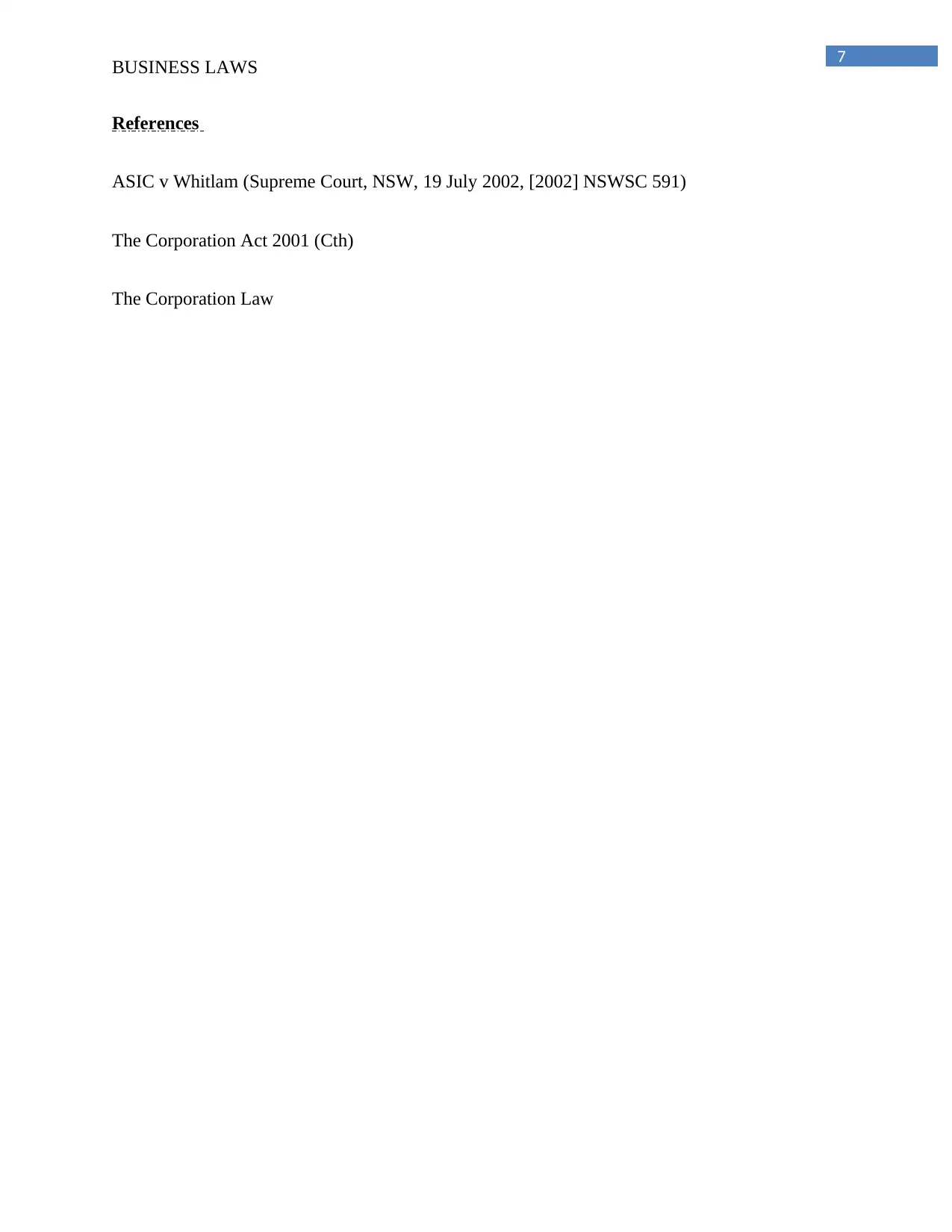
7
BUSINESS LAWS
References
ASIC v Whitlam (Supreme Court, NSW, 19 July 2002, [2002] NSWSC 591)
The Corporation Act 2001 (Cth)
The Corporation Law
BUSINESS LAWS
References
ASIC v Whitlam (Supreme Court, NSW, 19 July 2002, [2002] NSWSC 591)
The Corporation Act 2001 (Cth)
The Corporation Law
1 out of 8
Related Documents
Your All-in-One AI-Powered Toolkit for Academic Success.
+13062052269
info@desklib.com
Available 24*7 on WhatsApp / Email
![[object Object]](/_next/static/media/star-bottom.7253800d.svg)
Unlock your academic potential
Copyright © 2020–2026 A2Z Services. All Rights Reserved. Developed and managed by ZUCOL.





